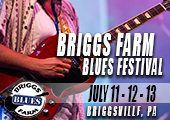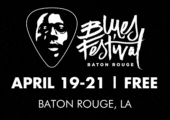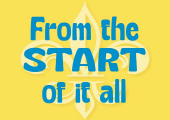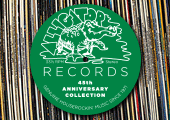CHRIS THOMAS KING
Big Grey Sky
21st Century Blues Records – 21CB-2142
It’s remarkable that it’s been 37 years since Chris Thomas King (as Chris Thomas) at age 24 released his first album on Arhoolie Records. During that time he has proved himself to be one of the most vital creative forces working in the blues idiom. There’s no questioning his blues bona fides, having grown up in his father, Rockin’ Tabby Thomas’ Tabby’s Blues Box and Heritage Hall juke joint in Baton Rouge, Louisiana. As a young musician, he backed up his dad and his coterie of area blues artists, including Raful Neal, Henry Gray, and Silas Hogan on whatever instrument was needed to fill out the band—guitar, bass, drums, keyboards. King, whose main instrument is guitar, added his second last name in honor of the greats of the blues guitar, B.B., Albert, and Freddie. He is steeped in the tradition but not fettered to it, viewing the blues as form that invites possibility. Over the years, he has played all styles of blues and incorporated elements of soul, funk, hip-hop, and country music into his “21st century blues.” In addition, he’s challenged the orthodoxy of blues scholarship with his book The Blues: The Authentic Narrative of My Music and Culture (2021), the first book written by an African American blues artist, positing that the origin of the music was in the Creole culture of 19th century New Orleans.
On seven of the ten tracks on Big Grey Sky, King, who produced and mastered the album, employs multi-tracking to perform on all the instruments—thanks to the versatility he developed during his juke joint years. Clearly, he’s a super-talented guy. Some of his musical diversity is on display here, but this is above all else an electric blues guitar showcase, and King is taking no prisoners. The title track sets the tone as his blistering lead evokes namesake Albert King. The shuffle Get Behind Me gives him an opportunity to weave together multiple crackling guitar parts and then flash his slide guitar chops. The Jimi Hendrix–inspired slow 12-bar blues One More Scotch builds in intensity, featuring a volcanic lead from King. It’s likely that King is aware if he’s going to cover Billy Myles’ Have You Ever Loved a Woman, there’s going to be comparisons to the Derek and the Dominos version; that certainly doesn’t deter him as he slows the tempo down and delivers a tour de force. On Mean Old World, King sidesteps the iconic Little Walter Jacobs approach and reaches back to jazz-inflected blues of T-Bone Walker’s version.
King explores the borderline between R&B and country with a cover of Chokin’ Kind, which is perfect vehicle for that given that outstanding versions of the song have come from Waylon Jennings, Willie Nelson, Joe Simon, and Snooks Eaglin. He opens with some beautiful acoustic guitar and poignant vocal and then builds the intensity with organ and electric guitar. Joined by Danny Infante on bass and Jeff Mills on drums, King shifts to piano for a rocking, gospel-tinged cover of Ray Charles’ I Got a Woman. Mills and bassist Eric Welch lock in a groove behind King on blues rocker Like a Cowboy Rambling. The ballad Home has some echoes of Hendrix’s Angel, and there’s a bit of a country feel to Sunshine. With Big Grey Sky Chris Thomas King delivers striking new music that once again affirms his position as one of the most talented artists working in the contemporary blues idiom.
—Robert H. Cataliotti
JOHNNY RAWLS
Walking Heart Attack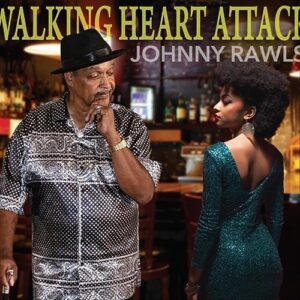
Catfood Records – CFR-033
Johnny Rawls has traveled the world delivering his own brand of soul blues during a career spanning more than 50 years, but Mississippi Dreams, from his new album, Walking Heart Attack, illustrates perfectly that his roots in the southern state run as deep as the river that gives it its name. Over a smooth-as-butter groove with lush horns, swelling organ, and sweet backing vocals, the tune pays homage to the natural beauty of the state of his birth as he sings, “Mississippi dreams keep me goin’ / of a soft breeze / gently blowin.’”
While the Hattiesburg native takes time to reflect on where he’s been on Walking Heart Attack, he doesn’t stray far from the tried-and-true lessons of healing, redemption, and love gone wrong that have been at the core of a career dating back to the 1970s.
In the mid-’70s, Rawls began learning the soul blues game at the foot of one of the masters as a guitarist and band director for O.V. Wright. After Wright’s death in 1980, Rawls and company continued touring as the O.V. Wright Band—evolving into the Ace of Spades—and opened shows for the likes of Bobby “Blue” Bland, Little Johnny Taylor, and B.B. King. Rawls moved on to join Taylor’s band before launching his solo career in the mid-’80s.
With longtime collaborator Catfood Records founder/bassist Bob Trenchard, Rawls applies his still potent pipes to a ten-song mix of covers and originals. He’s joined by a stellar backing unit of Dan Ferguson (keys), Richy Puga (drums), Johnny McGhee (guitar), Andy Roman (sax), Nick Flood (baritone, tenor, and alto saxes), Mike Middleton (trumpet), and Frank Otero (trombone).
Written by Rawls and Trenchard, the title track holds a pulsing, streetwise groove as Rawls settles into his well-worn role as a savvy purveyor of nighttime pleasures, albeit one who’s learned a thing or two about the hazards of said pleasures. “She’ll draw you like a moth to a flame / lie awake at night calling her name / when you go to sleep you’ll toss and turn / you beg for more / you’ll never learn.”
Rawls turns up the funk on Tell Me the Truth, while the soothing descending chord progression in the chorus gives the cover of the O.V. Wright single Born All Over a ’70s feel. A smoldering organ solo adds steam to the redemptive Heal Me. The bright and buoyant horn chart and urgent organ make One More Sin a shot of triumphant soul.
Rawls’ cover of Trying to Live My Life Without You stays true to the version that scored a hit in 1972 for soul singer supreme Otis Clay, one of his former collaborators. The smokey ballad Free, with its heavenly backing vocals, is a highlight.
Percussionist Jon Olazabal is the secret weapon on Lies, one of just two tunes with Rawls on guitar.
As always, Rawls is a pro’s pro: a singer unabashedly comfortable in his own skin, with vocals that are never forced and right on time.
—Rod Evans
RISING STARS FIFE AND DRUM BAND
Evolution of Fife and Drum Music
No label – No #
This album might just as well have been titled The Evolution of Sharde Thomas, because that’s what it documents—Thomas, the gifted granddaughter of the late fife player Otha Turner, carrying his musical legacy into the present day, evolving and adapting to incorporate a range of modernist influences and inspirations, yet remaining true to his spirit, which she has dedicated her life to honoring and keeping alive.
She invokes that spirit by bringing his voice back to life in the set’s Intro, primarily a recording made at his Gravel Springs, Mississippi, farm in 2016. We hear the drumming—rich with Africanist rhythmic influences overlaid by Anglo-European military cadences, the cross-cultural meld that defines the classic Mississippi fife-and-drum style—setting the pace for the next track, Fly With Me, which finds Sharde singing and playing her fife over a guitar-drums-bass backing, the instruments interweaving in melodic and percussive patterns that craftily update those very same rhythms, recast in a fully contemporary mode and seasoned with elements of the Afrobeat melodic and percussive ideas that Thomas and her bandmates encountered during their African sojourn earlier this year. She’s an expressive singer who has obviously listened to pop chanteuses like Tracy Chapman as well as earlier blueswomen such as the late Jessie Mae Hemphill, who also played in fife and drum bands (including the one led by her grandfather, Sid Hemphill) and was an important early influence.
From there we journey through a literally timeless landscape, segueing from deep-rooted acoustic fife-and-drum work through electrified R&B/hip-hop-charged improvisations and elaborations on those venerable themes, sometimes enhanced by samples from earlier Rising Star performances, on material ranging from Otha Turner originals (You Know That Dog Gon Bite) through blues classics (Sittin On Top of the World, a collaboration with Philly-based blues rapper G. Love, and Hidy Ho, a stark re-imagining of the Cab Calloway standard), to fresh contributions from Thomas herself and various collaborators and compatriots.
Don’t expect any kneeling at the altar of “authenticity”—several of these tracks feature very little fife and virtually no “real” drums at all, as electronic beats, looped samples, and other modern-day techniques (even including, at one point, Sharde’s own voice auto-tuned) replicate and elaborate on the primal sounds and cadences of the all-acoustic fife-and-drum music that Thomas continues to venerate and perform on most of her live gigs. There’s little danger that she’ll abandon those roots, but, as forward-looking artists have always done, she will grow and cultivate them, determined to explore new territory and blaze new trails rather than hew obsessively to the tried-and-true. As her liner notes tell us—reflecting the saucy self-confidence that has characterized Sharde Thomas since she first began appearing with the original Rising Star Fife and Drum Band when she was about seven years old—“Her life has always been the bomb-diggity and she will never forget her roots in Mississippi.”
—David Whiteis
COCO MONTOYA
Writing on the Wall
Alligator Records – ALCD 5014
Coco Montoya has been consistently delivering great albums for decades now, and his reputation remains intact with this latest Alligator Records release. Indeed, Writing on the Wall offers 13 tracks of blistering blues, featuring some of Coco’s strongest original compositions, along with a few special guests who dropped in to help move things along.
Montoya kicks the door in right at the outset with the slow-swaggering stinger I Was Wrong, which features his razor’s-edge vocals, only matched by his laser-sharp Strat on this minor key blues ballad. Save It for the Next Fool has a heard-it-through-the-grapevine funk feel that won’t let you sit still. In the end he dismisses his temptress: “Save it for the next fool, baby, ’cuz now I’m gone.”
You Got Me (Where You Want Me) is a greasy Houston, Texas, shuffle—a tune by Don Robey, the man that helped put crooner Bobby “Blue” Bland on the map. Coco does this tune some serious justice, as he trades rapid fire riffs with none other than Ronnie Baker Brooks—it’s one of the best highlights of the entire set. Brooks reappears on both guitar and vocals on the medium-tempo shuffle Baby, You’re a Drag. Once again, they gleefully swap six-string shots.
(I’d Rather Feel) Bad About Doin’ It adds a dirty New Orleans strut to the proceedings, with keyboardist Jeff Paris supplying the clever lyrics about giving in to temptation and not regretting it at all (“Eve has stole a piece of forbidden fruit and took herself a big-ass bite”).
Other highlights include Stop, a honey-dripper of a tune made famous by Lonnie Mack’s centerpiece from the 1985 Alligator Records Strike Like Lightning album. Coco Montoya plays and sings it in a higher key, yet it loses not one drop of intensity—in fact, it’s even more intense.
The title track, Writing on the Wall, is joint effort from Montoya, Dave Steen, and Jeff Paris (who serves up a seriously bluesy guitar solo). Montoya and Paris team up again on the laid-back rocker Late Last Night as well as the pensive What Did I Say?, a piece that has all the flavors of the best sides in the 1960s recorded by William Bell for Stax Records. More goodies come in the form of a cameo appearance from slide guitarist Lee Roy Parnell on guitarist Dave Steen’s original composition A Chip and a Chair.
The Three Kings and Me is a beautifully penned Christmas song by Dave Steen, devoted to the holy guitar trinity of Freddie, B.B., and Albert, while Natural Born Love Machine sends listeners home with the rollicking rhythm of the Montoya/Paris writing collaboration.
Produced by longtime West Coast friend and drumming ace Tony Braunagel (who sits in on four tracks), there’s no shortage of material to sink your teeth into. With 13 tracks to whet your appetite, this album is bound to win some awards when trophy time comes around next year in Memphis. Looks like the left-handed bandit has struck again.
—Wayne Goins
CHRIS BEARD
Pass It on Down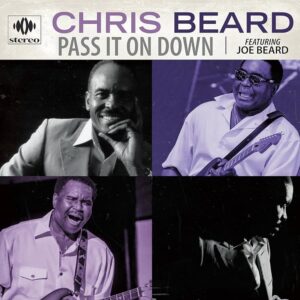
Blue Heart Records – BHR 033
In his debut release for Blue Heart Records, Chris Beard delivers Pass It on Down, a fitting title that tilts his hat toward what he rightfully inherited from his guitar patriarch, Joe Beard, who makes his presence felt in a most meaningful way for his son’s seventh album as a leader.
Beard comes out firing with the funky drum intro of the first tune, Let the Chips Fall. The perky, Tower of Power–style horns and skunky rhythm guitar lets you know what kind of mood he’s in, and the jailbreak guitar solo instantly confirms your suspicions. He deftly travels the path of Robert Cray when he delivers One More Cry for Love, a moving song about a girl who gave up her life on the streets because she has a child on the way.
The title track to the album, Pass It on Down, was co-written by vocalist Johnny Rawls. It has a B.B. King–tinged blues riff, finds papa Joe singing lyrics back to Chris about how proud he is of his son, and asks Chris to do the same for the next generation.
House of Shame is one of the most powerful tunes on the album—it’s a slow, 6/8 gospel groove in a minor key, written about a man who has no more walls to hide his cheating ways (“I sit all alone on my house of shame / got no protection from the driving rain”). An exceptional performance is delivered by the killer rhythm section of John Tucker on keyboards, Carlton Campbell on drums, Marvin Parker on bass. This is followed by the up-tempo, funk-filled romp When Love Comes Knocking, a paean dedicated to the irresistible temptations that overcome Chris’ inner urges.
Son I Never Knew highlights Beard’s knack for great lyrics—this time it’s about an estranged relationship with his own offspring (“I just want a minute or two with the son I never knew,” he begs the mother). This passion play is instantly reminiscent of the guitar playing and singing approach of master bluesman Jimmy Dawkins and features Beard’s guitar tone that is similarly rich and round. Produced by none other than Louisiana legend guitarist Kenny Neal, the entire clan from Baton Rouge is present: Kenny on rhythm, Darnell on bass, Gralin Hoffman on drums, Frederick on keyboards.
Things eventually settle to a simmer with a beautiful ballad, Keeps Me Believing; Beard sings with a smooth-yet-gravelly voice à la Taj Mahal’s patented singing style. Meanwhile, Who Do You Think You’re Foolin’ has a Love and Happiness horn riff cleverly tucked away inside the tune—you’ll have to wait ’til the end to glean it. The closing track, Bitter Baby, is the tastiest way to land the plane—a medium-slow traditional blues, featuring an absolutely delicious acoustic piano solo by Jonathan Curry and a stinging, Albert Collins–inspired solo and lyrics to boot.
Beard’s penchant for storytelling is the main element that permeates the lyrics in his songwriting. It deserves mentioning that several tracks on the album have tight three-part vocal harmony underpinning the song lyrics that enhance the entire sonic sensation served up by Chris Beard and his band of blues brothers.
—Wayne Goins
CANDICE IVORY
When the Levee Breaks: The Music of Memphis Minnie
Little Village Foundation – LVF 1057
Living Blues readers will hardly require an introduction to Memphis Minnie, born as Lizzie Douglas, one of the most iconic artists of the golden era of the blues. She also ranks high on the favorites list among contemporary women blues singers, who have covered the vast majority of her songs. Candice Ivory is not the first, and she won’t be the last, but her take on Memphis Minnie is joyously new, unique, and vibrant.
When the Levee Breaks packs a dozen of Memphis Minnie’s songs, recorded with a full band. The album was produced by Charlie Hunter, who also adds virtuosic guitar, supported by the swift pedal steel guitarist DaShawn Hickman. The rhythm section is held down perfectly by George Sluppick on drums, along with two percussionists—Brevan Hampden and Atiba Rorie.
Candice Ivory sings it sassy and sensuously, with just the right mix of passion, power, and confidence. No wonder they call Ivory the “Queen of Avant Soul.” She could belt out a song that would make a block of stone weep from joy. The liner notes point out, “Her great-uncle was the singer and guitarist Will Roy Sanders of the Fieldstones, one of the premier Memphis blues bands from the 1970s to the 1990s. Ivory grew up in the church, and by the age of eleven, she was singing in a choir that featured the soon-to-be-famous R&B artist D’Angelo.”
There are lots of gems here. Take When You Love Me, a sublime acoustic cover as fine as it has ever been recorded. Memphis Minnie fans will surely find songs to love on this album, perhaps the two closing cuts: HooDoo Lady, a song packed with emotive feeling, superb acoustic guitar picking, and convincing singing by Ivory and New Bumble Bee with its cool reggae vibe.
When the Levee Breaks is a compelling and funky interpretation of Memphis Minnie, an awesome album that Minnie would surely boogie to if she could hear it over yonder.
—Frank Matheis
NICK WADE
Feeling Good Is Good Enough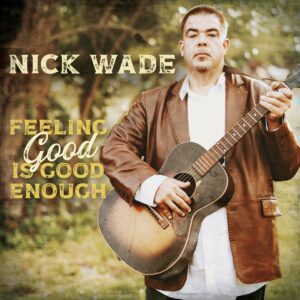
Nick Wade and Extra Sensory Productions – NWM-2301
Nick Wade has been playing the blues for more than 30 years, since he was five years old. But he hadn’t recorded and released an album until now with Feeling Good Is Good Enough. The record doesn’t play like that of a first-time recording artist; it’s the sounds of a steady hand and competent feel for pre-war acoustic blues.
Wade presents 12 of his original compositions, performed and recorded live-to-tape in his Green Springs, Virginia, hometown. Guided by his sturdy guitar playing and heartfelt vocals, Feeling Good Is Good Enough moves gracefully from song to song. Album opener Sky Line Drive sets the tone for the LP, an evocative piece of back-porch blues that moves along at a casual, amiable pace.
It’s hard to believe Broke and Busted is a Wade-penned tune as it sounds like a track that’s existed for a century. He plays a rhythmic little guitar lick and earnestly delivers the hard-luck tale—out of cash, heartbroken, and alone—laid out in the lyrics. Lonesome Copperhead Snake receives a boost from some killer mouth harp courtesy of album co-producer Li’l Ronnie Owens, his runs on the harmonica leading to some fantastic interplay with Wade’s fingerpicking leads.
Wade further showcases his dexterous touch as a guitar player on the succeeding track, the instrumental Ragamuffin. It’s a jaunty number and an excellent display of his musicianship. It pairs nicely with the album closer, Raggin’ My Blues Away. Another instrumental track, it’s a toe-tapper, readymade to dance a little jig to or just sit back and enjoy.
Overall, Feeling Good Is Good Enough marks a strong start to Wade’s recording career and is more than worthy of your time.
—Jim Shahen
TOM HAMBRIDGE
Blu Ja Vu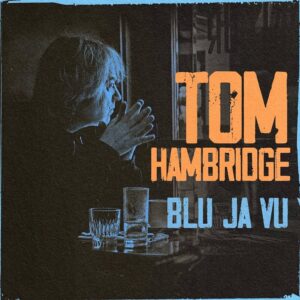
Quarto Valley Records – QVR 0172
Tom Hambridge has a weighty résumé. A 1983 Berklee graduate, much of the Buffalo native’s work has been behind the scenes. As a composer, he’s provided songs for a wide array of artists in many genres, including Susan Tedeschi, NRBQ, Ana Popović, George Thorogood, Johnny Winter, Delbert McClinton, Shemekia Copeland, Steve Cropper and Felix Cavaliere, Buddy Guy, Meat Loaf, Marcia Ball, Christone “Kingfish” Ingram, Keb’ Mo’, and many, many others. An in-demand producer and engineer, he has worked in the studio with many of those names plus scores of others. His credits as a drummer on those recordings—and, again, many more—are extensive as well.
Yet Hambridge’s releases under his own name have attracted comparatively little attention. After releasing a string of albums as T.H. and the Wreckage, he released his solo debut, Still Running, in 1996. A major label set, Balderdash, followed in 2000. Subsequently, every few years—in between his projects with and for names from that vast roll call of marquee artists—he has returned with another solo record. The NOLA Sessions from 2018 marked his seventh solo offering.
As solid as those releases have been, there’s an inescapable sense that Hambridge—a multiple Grammy nominee and four-time Grammy Award winner—focuses more on lifting up other artists than he does cultivating his own career as a recording artist.
Hambridge’s latest release, Blu Ja Vu, presents an opportunity for all of that to change. Whether they came to him or he dug into his Rolodex, several big names—friends and associates all—have pitched in to help Hambridge make an album. On Blu Ja Vu, Hambridge does what he does best: write songs, play drums, produce the sessions, sing his songs. But his famous friends stop by to add their signature style to his songs.
Aided by a crack core band, Hambridge leads the band from behind his drum kit. Of special note among those players is rollicking pianist Kevin McKendree. Buddy Guy sings a bit and plays guitar on the Stonesy opener Ain’t It Just Like Love. Joe Bonamassa rips up the fretboard (and sings, too) on That’s My Home. Kingfish contributes vocals and guitar on Blues Don’t Care. Elsewhere, the late James Cotton, Josh Smith, and Chuck Leavell help out.
But it’s a testament to Hambridge’s artistry—and perhaps an augur of his future—that he isn’t lost among the celebrity guests on Blu Ja Vu. The searing Johnny Winter is a plea for the late Texas blues master to receive greater recognition. That and tracks like the ZZ Top–ish Wear You Out—featuring just Hambridge and his band—are among the most incendiary moments on the whole set. The record is a cohesive collection that showcases Tom Hambridge’s many gifts.
—Bill Kopp
CLARENCE EDWARDS
Baton Rouge Downhome Blues (Louisiana Swamp Blues, Vol. 9)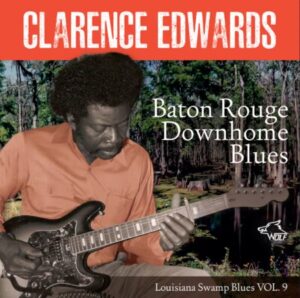
Wolf Records International – CD.120.635
Clarence Edwards went largely unheralded as a working blues artist for most of his life, only gaining recognition in the years immediately preceding his death in 1993. With few albums to his name, he exists on the periphery as a minor figure who could play a wide range of styles within the blues genre. A new release from the Austrian label Wolf Records International, Baton Rouge Downhome Blues highlights those skills, as well as his dynamism as a live performer.
What really stands out about the quality of the performances on Baton Rouge Downhome Blues is that it’s unknown when they occurred, beyond a 1990–1993 timeline, and who all the musicians are playing on each track. Edwards had a core group of Steve Coleridge (who recorded and mixed the record) on bass and drummer Ronnie Houston, but other folks would sit in from time to time and play. Regardless of date and roster, Edwards and the various permutations of his band sound phenomenal.
Down Home Blues features a powerhouse vocal performance from Edwards, as well as some killer lead guitar work and mouth harp. The version of Muddy Waters’ I Want You to Love Me is swampy blues perfection, while Hoochie Coochie Man is propelled by the band’s rhythmic vamp. Well, I Done Got Over It, with its country blues swing and playful vocal delivery, provides a snapshot of Edwards’ musical versatility. Baton Rouge Downhome Blues concludes with Edwards’ interpretation of Highway 61 Blues. His arrangement is scorching, with Edwards offering up a tasty guitar solo and booming vocals.
From start to finish, Baton Rouge Downhome Blues is a lively and entertaining listen and an archival release of note.
—Jim Shahen
AL BASILE
B’s Time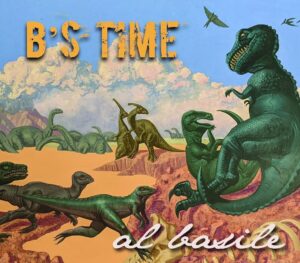
Sweetspot – SS9948
After carving out a solid, if behind-the-scenes, reputation as a first-rate trumpet and cornet player with Roomful of Blues in the early 1970s and again with Duke Robillard’s band in the ’90s, Al Basile has had a second, more public, career as a leader the last quarter century.
Beginning with the 1998 release with Robillard of Down on Providence Plantation, Basile has issued a total of 16 albums on his own Sweetspot Records as leader or co-leader. Make that 17, with the release of the retrospective compilation B’s Time.
The 17 tracks found here draw on most of those releases, providing a nice overview of a solo career that’s been marked by his development as vocalist while still featuring his horn. There is no discernible order on this collection; rather, Basile (who produced the release) seems to have chosen the songs much as he might build a setlist, aiming to mix things up a bit and keep it interesting.
While most of his catalog is marked by an up-tempo, swing-infused jump blues vibe, he takes in a broad swath of territory, which is richly captured here: I Really Miss You from that first release with Robillard is a guitar-driven blues with Basile on vocals, while B.D. from 2003’s Red Breath is straight-ahead, post-bop jazz anchored by pianist Paul Odeh’s imaginative leads. While We’re Dancing (The Tinge, 2007) finds Basile in a New Orleans retro jazz vein playing horn and singing atop pianist Bruce Katz’s light comping, while Causing Joy (Soul Blue 7, 2009) lays a slow blues atop a reggae beat. And his soaring vocal duet with Sista Monica Parker on Make a Little Heaven (Woke Up in Memphis, 2014) is a percolating bit of vintage R&B.
Basile wrote all the songs except Don’t Wait Too Long, and if he’s yet to have a crossover hit, he does have a nice touch at crafting warm melodic tunes full of aural hooks. He also has a golden touch at assembling tight bands for each outing, and has enlisted Robillard to produce most of his albums.
This is, as is undoubtedly the aim for a retrospective compilation, a wonderful introduction to Basile’s music. Listeners new to his work will find this a highly useful guide to exploring his catalog.
—Jim Trageser


